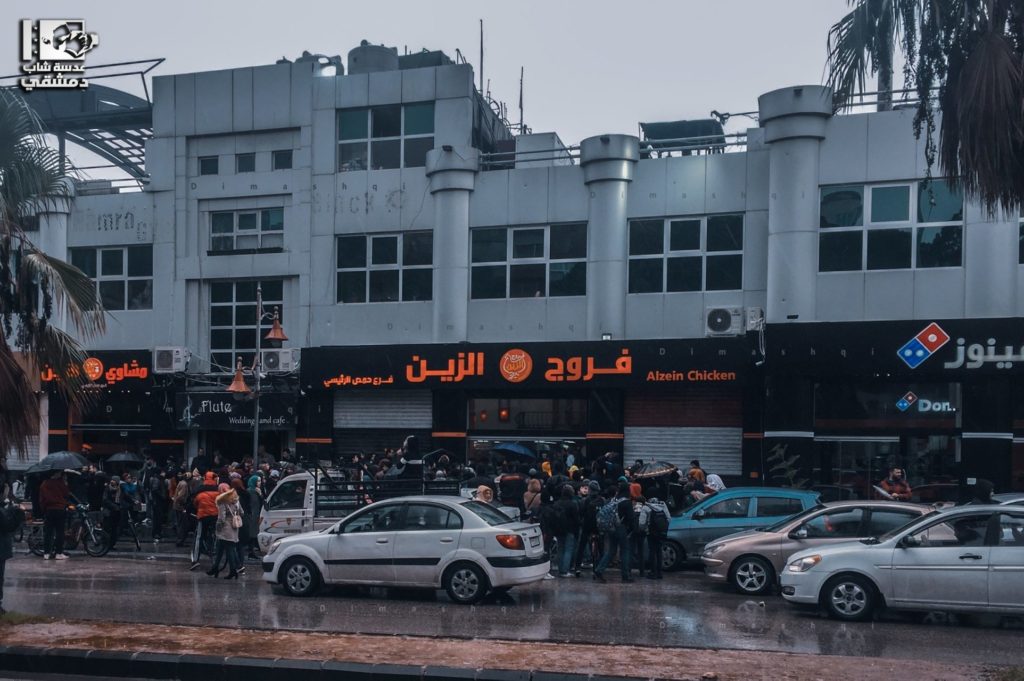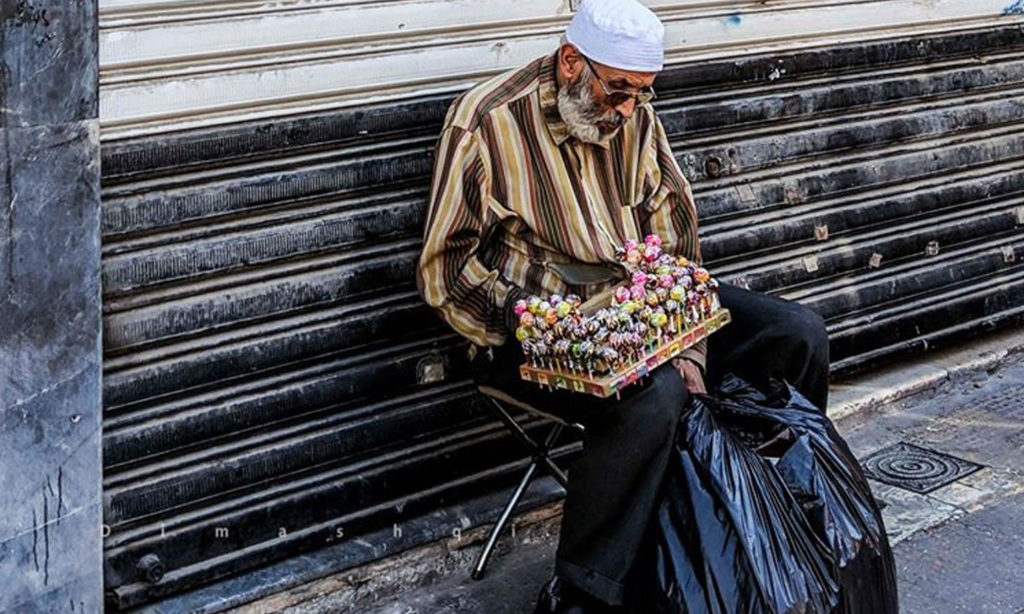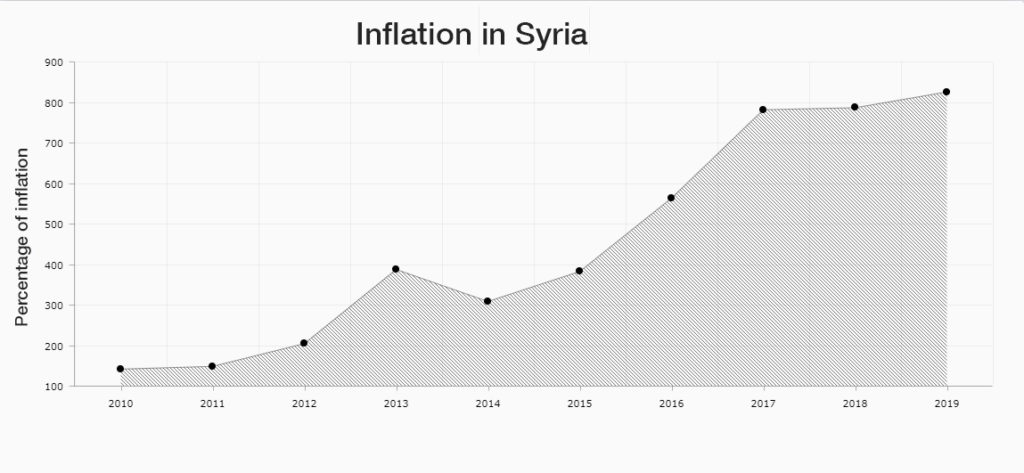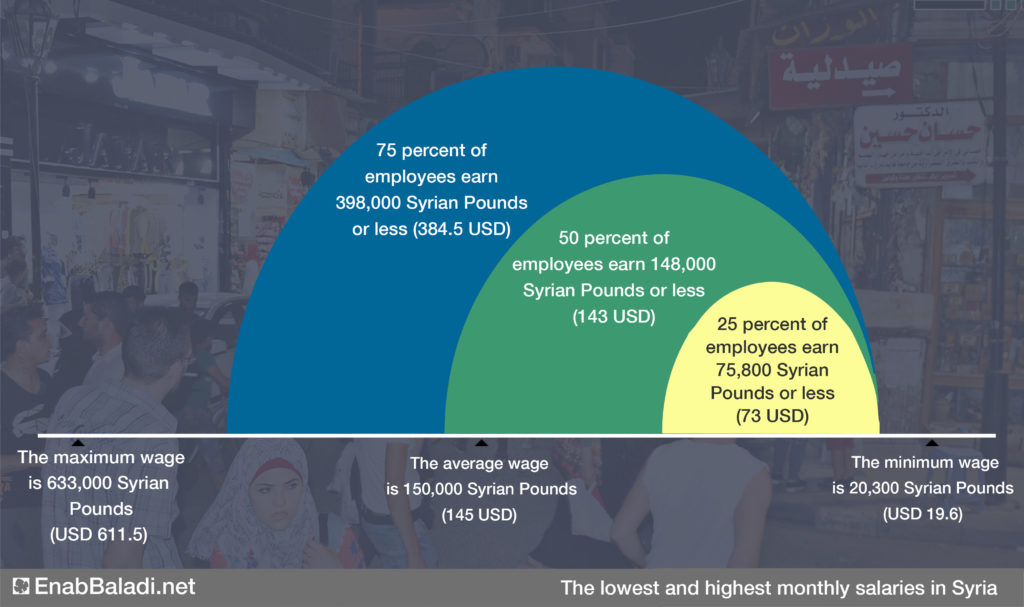Mais Shettian | Saleh Malas | Zainab Masri |Yamen Maghribi
Syrians are following up on a daily basis the indicators of the decline of the Syrian Pound, which has reached unprecedented levels, being affected by a number of political factors, and affecting the solidity of the livelihood of Syrians in regime-controlled areas.
These prompt follow-ups, accompanied by a set of expectations, which are quickly reflected in food prices, then consumables. All this necessarily requires a set of decisions and reactions.
In southern Syria, specifically in the city of As-Suwayda, the reactions took the form of protest and rejection, through demonstrations led by a group of activists. As much as these demonstrations seemed to inspire activists in other governorates, they did not resonate nationally, amid a government hinting at accountability against those who “insult the state financially.”
Enab Baladi discusses in this file the impact of the deteriorating economic situation in Syria on the livelihood of the population, and government decisions related to the recent decline of the Syrian Pound, and proceeds from the protests in As-Suwayda to know the extent of their generalization to the rest of the Syrian governorates, in light of the economic and livelihood reality.
“We Want to Live”
A deteriorating living situation that the people of As-Suwayda reject by demonstrations
Hassan decided to join the demonstrations in As-Suwayda, in protest against the severe living conditions. Since he is a government employee, his monthly salary is not enough to pay the costs of his family’s needs for the next ten days.
Hassan, 38, from the village of Malah in the countryside of As-Suwayda, works at the Electricity Company. He told Enab Baladi that he practices another work to secure additional income, as after paying the bank’s monthly installment, only 70,000 Syrian Pounds remain from his salary and the salary of his wife, who works as a teacher.
“We eat meat on occasions; only our children have eggs and milk, and we have the three meals only in holidays,” Hassan said, justifying his desire to “shout out loud,” without guaranteeing the result of that shouting.
Hassan stressed that he needs at least 300,000 Syrian Pounds to secure his needs and the needs of his wife and two children, while he stopped purchasing many varieties of vegetables and fruits. He asserted that he relied on the crop of his agricultural land, gave up buying fuel oil and relied on firewood and nylon bags for heating, which negatively affects the health conditions of his two children.
As for medical expenses, Hassan added that most doctors in the region suspended their contracts with insurance companies, which caused additional financial burdens incurred when a family member falls ill. Also, the medicines registered on the healthcare register are rare. He pointed out that his wife needs foreign medication for the gland, costing 9,000 Syrian Pounds per month.
This reality prompted Hassan to participate several times in the demonstrations held in As-Suwayda Governorate, and criticize corruption and deteriorating living and economic situation, along with other demonstrators who started their protests on January 15, in the cities of As-Suwayda and Shahba.
During the demonstrations, the protesters arrived at the Sir Square in front of As-Suwayda Governorate building, denouncing the collapse of the Syrian Pound, and what they described as government corruption. People also chanted for the governorates of Tartus, Hama, Homs, Daraa, Latakia and Damascus.
“The Syrian people are united” was one of the most chanted slogans by the demonstrators, after the economic conditions have been deteriorating in most of the Syrian areas.
The official Syrian News Agency (SANA) reported the news of As-Suwayda demonstrations, and said that a few people gathered in the President’s Square, also known as Sir Square, in the center of the city of As-Suwayda, and chanted “We want to live,” in rejection of the living conditions.
The Syrian markets in the regime-controlled areas have been witnessing a sharp rise in foodstuff prices by 50 percent since the beginning of this year. The cost of foodstuffs in those markets has been different from the official price, as monitored by Enab Baladi from local sources, in conjunction with the depreciation of the Syrian Pound to more than 1,000 against the dollar.
Despite this, 80 percent of Syrians live below the poverty line, according to a report issued by the United Nations in March 2019, and 11.7 million Syrians need some form of aid, including food, healthcare and shelter.
Besides, the purchasing power index in the capital Damascus witnessed a significant decline, reaching 10.84 points, and the global NUMBEO website ranked it as very low. The cost of living index has also registered a considerable decrease to 27.47 points, and the quality of life index reached 34.35 points.
The average monthly income of the Syrian citizen is currently 150,000 Syrian Pounds. At the same time, the minimum salary in Syria is 20,300 Syrian Pounds, and the maximum limit is 663,000 Syrian Pounds, according to statistics published by the SalaryExplorer website.
Hassan does not much trust the government measures, like other protesters in As-Suwayda against the spread of corruption, the loss of public funds in the hands of a small group of officials. He also finds no hope in any real measures that would save the living conditions and stop the depreciation of the Syrian Pound.
The security grip remains one of his most significant concerns, as despite appearing in the protests and chanting in the street, Hassan refused to publish his full name in the interview with Enab Baladi, for fear of persecution and arrest.
Hassan is also disturbed by attempts by some to go in line with the government’s will not to criticize or protest against the financial situation, and to support it morally through campaigns, which Hassan believes are carried out to “laugh at citizens.”

Citizens gathered in front of a restaurant that announced selling food at one Syrian Pound in Homs, Hamra Street – January 20, 2020 (Lens Young Dimashqi)
Governmental measures to reduce the depreciation of the Syrian Pound
Will they bear fruit?
The successive declines in the value of the Syrian Pound against the dollar since the beginning of this year have led the Syrian regime government to take strict measures against those dealing in dollars.
The Syrian Pound against the dollar has sometimes recorded a decrease of more than 30 percent of its value, compared to the end of 2019, according to the Syrian Pound Today website, which is specialized in currency exchange rates.
Criminal penalties
The most important measures taken by the government is the decree issued by the President of the Syrian regime, Bashar al-Assad, on January 18, 2020, which stipulates the imposition of a prison sentence and the payment of a fine on those who deal with other currencies than the Syrian Pound. The decree came as an amendment to the second article of Legislative Decree No. 54 of 2013, which used to penalize those who deal with other currencies than the Syrian Pound with three months to three years imprisonment.
According to the new decree, every person who deals with another currency than the Syrian Pound as a means of payments “shall be punished by temporary imprisonment with hard labour for no less than seven years,” and shall be penalized with “a financial fine equivalent to twice the value of the payments, the used or paid amount, or the offered services or goods,” in addition to the confiscation of payments, the used sums, or precious metals, for the benefit of the Central Bank of Syria.
Al-Assad issued a second decree affirming the imposition of a “temporary detention” penalty, and a fine of one to five million Syrian Pounds, for anyone who broadcasts, publishes, or republishes fabricated news or false or fake allegations by one of the means, to cause subversion or destabilize the national currency and its exchange rates, which are determined by official bulletins, in addition to undermining confidence in the strength of the country’s cash and bonds.
The issuance of the decrees coincided with a warning issued by the Ministry of Interior against using other than the Syrian Pound while making trade transactions. The Ministry confirmed, via Facebook on January 17, intensifying its patrols to monitor companies, shops and individuals, in an attempt to suppress the phenomenon and arrest violators.
The Central Bank of Syria, in turn, issued a circular on January 20, declaring its readiness to buy dollars from citizens at the preferential price that it set for humanitarian organizations, which is 700 Syrian Pounds against one dollar and without official documents.
Another nail in the economy’s coffin
Enab Baladi met the head of the Syrian Economic Working Group, Osama al-Qadi, to try to clarify the economic reasons that prompted the regime’s government to issue these decrees and take such strict measures at this particular time against individuals who deal with other currencies.
Al-Qadi described the recent measures taken by the regime as “hysterical,” and indicated that the Syrian economic decision-maker had “completely lost balance,” noting that Bashar al-Assad had taken Syria back to the 1980s when foreign currencies were banned, and money exchanges were shut down. These measures were dismantled in 1991 with Law No. 10, in the era of Hafez al-Assad, known as the era of “economic openness” law.
He added that al-Assad had undermined more than 1,200 legislative decrees he issued since 2000 designated to open the Syrian economy to the world.
Al-Qadi believed that by employing these measures, the regime is putting “a new nail in the coffin of the Syrian economy,” which was exposed to crises after the enormous financial hindrance caused by the Lebanese banks’ decision to freeze the accounts of many Syrians, and the US economic sanctions against Syria, i.e. Caesar Act, the strong effect of which started being reflected on the Syrian economy.
Whereas, according to al-Qadi, Syria will witness, in light of the new decisions, the reluctance of a large number of industry professionals and merchants to pursuit their investments due to their inability to secure the foreign currencies needed to finance their businesses, which will lead to raising the unemployment rate to more than 80 percent, and poverty to about 90 percent.
Al-Qadi pointed out that the Syrian Pound will undergo a slight improvement in the foreseeable future due to the cessation of supply and demand; however, it will witness a catastrophic decline in the long run, if those decrees and decisions remain, stressing that there is no solution to the disaster befalling of the Syrian economy unless there is a political solution that can ensure restoring order to the border crossings, oil and agricultural lands.
“Flawed” legislative decrees
How did al-Assad violate the constitution?
Decrees 3 and 4 issued by al-Assad carry measures considered as “an interference by the legislative authority in the work of the judiciary,” and thus violated the principle of the separation of powers stipulated in the 2012 Syrian constitution, and the law of judicial independence, which was confirmed by lawyer Ghazouan Kronfol, President of the Free Syrian Lawyers Association in Turkey.
According to Kronfol, there is no separation of powers in Syria, as all state powers are in the hands of the President of the Republic. In accordance with the principles of the legislative process, it is assumed that the decrees are to be issued by the Syrian Parliament exclusively.
Kronfol believed that the parliament’s right to make, amend and adjust the laws to fit legal and social reality in Syria had been usurped.
Article 132 of the Syrian constitution states that the judiciary is independent, and the President of the Republic shall guarantee this independence with the assistance of the Supreme Judicial Council.
Kronfol attributed the judiciary’s lack of independence to the two decrees, considering the President of the Republic as the head of the Judicial Council, and the Minister of Justice of his government is the Vice-President of the Judicial Council, who is also the one who appoints and dismisses the members of the Supreme Constitutional Court.
Decree No. 4 usurped the judge’s authority to release the accused until the date of issuance of the final verdict. The decree violates the principle of presumption of innocence of every person, protected by the constitution in Article 33, which stipulated that “freedom is a sacred right and the state guarantees citizens their personal freedom and preserves their dignity and security.”
Likewise, the judge’s authority to grant mitigating discretionary reasons has also been suppressed, which subjugates him or her to the dictations of the executive authority that actually decides in the form of judicial rulings.
Syria. “Unsuitable environment for protests.”
Is As-Suwayda an exception?
In the past few days, As-Suwayda Governorate in southern Syria has witnessed several movements opposing the Syrian regime’s economic and political policies.
The regime has remarkably dealt with these demonstrations, as the official Syrian News Agency (SANA) reported these protests, and the regime’s security forces did not interfere with oppressing the protesters, as they did in the other cities, which witnessed unrest. Does this mean that the Syrian regime changed its way of handling the protests? What distinguishes As-Suwayda in this regard?
The security grip is well established
The Criminal Security Directorate in Syria has arrested people for trading in foreign currency and transferring funds without a license, as part of the Ministry of Internal Trade and Consumer Protection crackdown on foreign currency dealers, and in response to the latest legislative decrees.
This step has reinforced the prevailing belief that the Syrian regime is still utilizing its firm secure grip, within the framework of adjusting the economic and political reality on the ground, which indicates that the authorities will not possibly tolerate any potential protest waves.
The Syrian lawyer and director of the Center for Legal Research and Studies, Anwar al-Bunni, does not see that the two decrees as an expression of the regime’s desire to restore its security domination over the areas it is already controlling at the military level, as al-Assad needs no legal argument to arrest whoever he wants or create an atmosphere of panic in the cities under his control.
Several human rights reports have demonstrated the still standing security domination imposed by the Syrian regime on the areas under its control or the ones it regained control over in the past two years.
In 2019, the Syrian regime arrested, in the areas under its control, including Eastern Ghouta, Daraa, and south of Damascus, hundreds of former activists and opposition leaders as well as members of their families, although they all have signed reconciliation agreements with the regime’s government to ensure that they would not be arrested, according to a year’s events report issued by Human Rights Watch (HRW).
According to HRW, thousands died in the Syrian regime’s prisons in 2019, after being brutally tortured and forced to live in terrible detention conditions. Thus, the Syrian government updated records of hundreds “believed to have been lost or died; however, none of their families received the remains of their children or additional information from the regime’s government.”
In May 2019, Human Rights Watch was among eight Syrian civil society organizations and international human rights organizations that called on the UN Security Council member states to urgently address widespread arbitrary arrests, kidnappings, torture and other forms of ill-treatment, as well as the enforced disappearance of tens of thousands of Syrians by the regime’s security forces.
Is As-Suwayda an exception?
Enab Baladi contacted a security source in As-Suwayda to know the way the regime dealt with the protests. He described them as “soft,” suggesting that it is “still protecting minorities,” given that most of the governorate’s residents are members of the Druze community.
The source, speaking on condition of anonymity for security reasons, added that As-Suwayda is subject to a set of affiliations that are responsible for maintaining the security situation there, without direct intervention by the regime in this regard.
As-Suwayda was of the governorates that witnessed anti-regime demonstrations at the beginning of the Syrian revolution. However, the regime, which did not directly intervene in their suppression, cooperated with local militias from the people of the governorate to carry out the mission. This was found by Enab Baladi in a previous investigation entitled “As-Suwayda… An isolated island was awaiting its fate.”
Despite that, these militias carried out kidnapping, assassination and other violations, according to the security source, amid the regime’s “inaction” in controlling the situation.
As-Suwayda citizens expect that these militias, along with the recent decisions of the regime, will contribute to reducing the impact of protests and their spread in the governorate, which is proven by the decline of demonstrations less than a week after their outbreak.
How did Syrians deal with As-Suwayda protests?
The outbreak of As-Suwayda demonstrations on January 15 against the high prices and the deteriorating economic and living conditions were accompanied by calls by activists on social media for peaceful sit-ins under the slogan “We Want to Live,” a slogan that protesters raised in As-Suwayda.
Activists created pages and groups on Facebook, under the name “We Want to Live,” through which they stressed the peacefulness of the protests, and called for self-restraint during the movement and avoided using white or any other weapon.
Pages bearing the campaign slogan became a protest scene for activists from various Syrian cities, such as Jaramana, Salmiyah and Jableh. In contrast, others outside Syria expressed their solidarity with the protests of the people of As-Suwayda.
In an interview with Enab Baladi, one of the founders of the “We Want to Live” campaign, who we did not want to publish his name for his safety, stressed that the founders make sure that their movement be not exploited by any external party to deviate the path of “peaceful movement,” and that this movement be neutral in favour of the primary demands that revolve around the living situation and “rampant corruption” in state institutions, and the protest against the actions of “crisis traders, monopolists and manipulators of the country’s economy.” The founder addressed “all parties and everyone” that “We Want to Live… We Will Continue.”
The source added that the demands are precise, and it is not acceptable to exploit people’s suffering and depict their protests with something contrary to what they mean and claim, clarifying that the campaign is not affiliated to any political or religious party while denying describing it as a pro-regime or anti-regime campaign.
Just as the movement on the ground moved from the city of As-Suwayda to the city of Shahba in the same governorate, the movement of activists in the virtual world moved on social media, and they created a page named “We Want to Live – Salmiyah City,” to move the protests to Salmiyah City, east of Hama.
The page, followed by nearly 1000 people, showed the peaceful city’s solidarity with the protests through a statement issued by its admins to “unify the slogans” with the population of As-Suwayda. The statement explained that the “We Want to Live” campaign is launched by the youth and does not follow an organization pattern. It is instead a spontaneous campaign, which does not have any political, religious, or sectarian cover while stressing the demands to live “in safety, dignity and security.” The statement also noted that “all the people burdened with the pain of hunger will be brought together, whether they are oppositionists or loyal to the regime.”
The admins also published the requests of the page followers, such as creating a Facebook group aimed to circulate the dates and locations of demonstrations, in addition to studying their suggestions about the slogans they want to chant during the protests. They considered these demands as “beneficial to the campaign,” and they intend to implement them all.
The page admins talked, in a January 21 post, about their failure to demonstrate in the public square of Salamieh city at three o’clock due to the massive deployment of security and police forces, noting that the security elements, who were present to prevent the demonstration, outnumbered the demonstrators.
Enab Baladi monitored through local Facebook pages the solidarity of the locals in Tartus with As-Suwayda demonstrations, through comments on pictures of the demonstrations published by the page, unlike other Syrians who considered, via the comments, that these movements are “politicized” or “part of a conspiracy against the Syrian people.”
Will Syria witness a new wave of protests due to psychological factors caused by economic decline?
As-Suwayda demonstrations, and calls to protest in other governorates, opened the door to questions about the extent to which other Syrian areas could witness protests against the deterioration of the living conditions in the regime-controlled areas.
Before answering this question, it is necessary to discuss first the ways in which the economic crisis is affecting the citizens’ psychological state and, therefore, their motivations and reactions, which may lead to protests.
Specificities of the Syrian case
Psychiatrist Jalal Nofal believed that the correlation between the economic crisis and the psychological and living conditions in society is not linear at all, but rather mediated by a wide range of factors and influences.
Locally, the Syrian society is overwhelmed by a deep sense of “defeat,” according to Nofal, who explained that “there has been a revolution and Syria has been destroyed as a result of the reactions of the existing authority, so the community’s confidence in itself has crashed, and people may not have the ability to confront the massive oppression of the Syrian regime or other political groups present in Syria.”
Nofal added that it is not guaranteed that Syria will witness a wave of widespread protests, nor will the people necessarily regain the desire to make changes as a result of the experience they came to acquire during the past nine years.
More protests?
The Syrian journalist Ahed Murad, originally from As-Suwayda Governorate, indicated that As-Suwayda demonstrations would be replicated in other regions, in case the demonstrators managed to extend the protests for a more extended period.
Murad justified his opinion in an earlier interview with Enab Baladi by saying that the demonstrations are “based on popular demands,” as the population of As-Suwayda “is not politically aligned with any party and does not belong to the opposition forces (in the typical political meaning of the term opposition, which is engraved in the recent Syrian memory). Thus, these protests express a frank disdain for corruption, its repercussions, as well as the behaviour of the ruling party.”
Nofal, who expressed his uncertainty about the fate of these protests, does not see that “hunger can necessarily lead to a revolution.”
The situation of the Syrian society may limit the scope of this opportunity to force change, especially about “the immaturity of the political conditions that allow the psychological and social condition of people to be translated into certain expressions of feelings and thoughts centred on protest and indignation.”

Citizen in front of a garbage container in al-Shahbandar area, central Damascus – October 25, 2019 (Lens Young Dimashqi)
if you think the article contain wrong information or you have additional details Send Correction
النسخة العربية من المقال
-
Follow us :
Most viewed
- Turkey moves to deploy air defense system in Syria
- Intentions for popular resistance amid Israeli escalation in southern Syria
- Washington's conditions raise questions about its openness and goals in Syria
- SDF to withdraw from Aleppo neighborhoods following agreement with Damascus
- Syrian returnees celebrate first Eid after liberation












 A man pulling a loaded vehicle in the ancient city of Damascus - 13 January 2020 (Lens Young Dimashqi)
A man pulling a loaded vehicle in the ancient city of Damascus - 13 January 2020 (Lens Young Dimashqi)





 A
A
A
A
A
A













 More In-Depth
More In-Depth